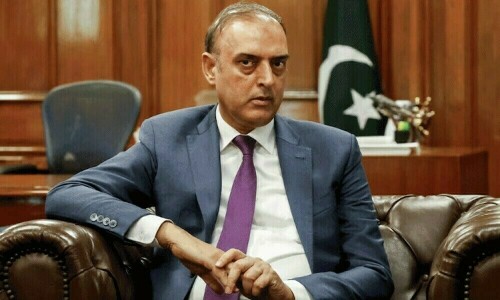Sustainable Economic Growth Targeted by SBP
Pakistan is committed to avoiding “repeating prior errors, such as excessively accelerating demand and economic expansion,” according to State Bank of Pakistan (SBP) Governor Jameel Ahmad on Monday.
Speaking at the inauguration of the Women Entrepreneurs Finance Code, a collaborative effort between SBP and the Asian Development Bank (ADB), he voiced optimism that the ongoing shift from diligently achieved economic stability to growth would prove sustainable, diverging from the recurring cycles of boom and bust observed in recent years.
He stated that the significant accumulation of the nation’s foreign exchange reserves (held by SBP) is a primary factor underpinning his confidence in attaining enduring economic growth this time. The SBP’s FX reserves have increased fivefold to $14.5 billion, a substantial rise from less than $3 billion at the start of 2023.
“This accumulation of reserves is the result of our FX acquisitions (from domestic currency markets, including the interbank market) rather than external debt obtained by the government, as was the situation between 2015 and 2022,” he clarified.
He further noted the notable decrease in the inflation rate, the transition of the current account to a surplus, and the expansion of SBP’s FX reserves. “The exchange rate demonstrates relative stability, and economic growth is gradually gaining traction… Significantly, the current economic outlook appears considerably more encouraging than it did a few years prior,” he added.
Due to the rigorous yet essential macroeconomic stabilization measures implemented by the SBP and the government, “we have successfully navigated the challenging period,” he stated.
Avoiding Past Mistakes is Key
“The stabilization period has frequently been succeeded by a boom-bust cycle. To prevent a recurrence of these patterns (this time), it is essential to avoid repeating past errors, such as rapidly increasing demand and economic growth, particularly in inward-focused sectors,” Ahmad cautioned.
“Economic growth is displaying indications of a gradual, consistent, and sustainable recovery. In contrast to earlier episodes of boom-bust cycles, the current policy mix supports a lasting increase in economic activity rather than a superficial, fragile, and populist surge… With an increasing emphasis on structural reforms, we firmly believe that this juncture represents a genuine turning point for Pakistan’s economy,” he added.
Ahmad explained that the confidence in achieving sustainable economic growth is substantially bolstered by a nine-year low headline inflation reading of 4.5% on average in fiscal year 2024-25. “We are increasingly confident that a judicious and coordinated combination of monetary and fiscal policies will stabilize inflation within its target range of 5% to 7%.”
He also asserted that the FX market remains stable, supported by robust external account performance and a high-quality accumulation of FX reserve buffers. “The current account balance is projected to remain favorable, driven by strong remittances and resilient exports, despite rapid growth in both the value and volume of imports, in line with the ongoing economic recovery,” the SBP Governor stated.
He affirmed that fiscal policy has proactively supported monetary tightening, as demonstrated by the second consecutive primary surplus in fiscal year 2025. “Both tax and non-tax revenues have exhibited substantial growth, while overall expenditures have remained relatively controlled. The Government of Pakistan is aiming for a higher primary surplus for fiscal year 2026.”
Finally, and most importantly, the focus is now directed toward reforms that address structural issues. “Efforts to broaden the tax base, privatize SOEs (state-owned entities), and liberalize trade will enhance efficiency, strengthen the role of the private sector, and improve competition,” he concluded.
The State Bank of Pakistan introduced the Women Entrepreneur Finance Code, accompanied by a $500 million loan program to aid women-led enterprises.
Approximately 20 banks and financial institutions have joined this initiative, which also receives support from the World Bank.



Comments (0)
No comments yet. Be the first to comment!
Leave a Comment